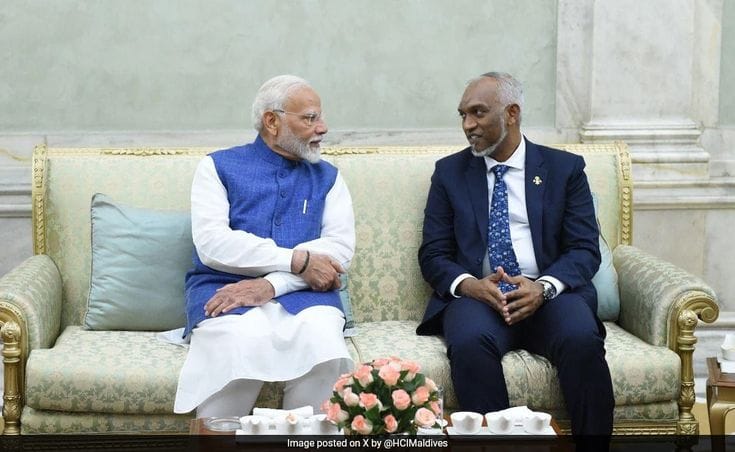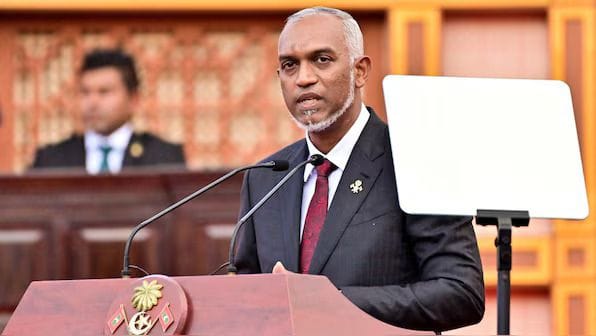Maldives Will Never Undermine Indian Security: Statement by President of the Maldives…
Statement by President of the Maldives: Maldives Will Never Undermine Indian Security. In October 2024, Maldives President Mohamed Muizzu made a landmark statement during his official visit to India, reaffirming that the Maldives would never compromise India’s security interests, even as the nation embraces a “Maldives First” policy. This declaration came at a critical time, as the Indian Ocean region is witnessing a growing competition for influence between India and China. Muizzu’s visit, his first since taking office in 2023, aimed to reset relations with India and ease concerns that his pro-China stance might pose risks to India’s strategic interests. His assurances reflect the nuanced balancing act Maldives must perform between maintaining its sovereignty and ensuring regional stability.
The Context of Maldives’ Strategic Importance

The Maldives, a small island nation located in the Indian Ocean, holds immense geopolitical significance due to its strategic position along major maritime routes. For decades, the Maldives has enjoyed strong ties with India, which considers the nation vital to its regional security interests. India’s “Neighborhood First” policy places particular emphasis on maintaining stability and friendly relations with its neighbors, including the Maldives, given its proximity to crucial shipping lanes that are integral to India’s energy security and trade routes.
However, this close relationship was tested in recent years, particularly with the rise of Mohamed Muizzu, whose political platform included a more nationalist, pro-China stance. Muizzu campaigned on the promise of reducing India’s influence in the Maldives, specifically by withdrawing Indian troops stationed in the country for humanitarian and technical support. His rhetoric played into a rising sentiment among some Maldivians who perceived the presence of Indian troops as an infringement on the nation’s sovereignty.
The Pro-China Shift: Concerns and Consequences
Following his election, Muizzu’s administration quickly moved to realign the Maldives’ foreign policy to reflect a more independent stance, which included deeper engagements with China. The Maldives’ involvement in China’s Belt and Road Initiative (BRI) was expanded, raising eyebrows in New Delhi. China’s growing footprint in the Maldives, particularly in terms of infrastructure investment and economic aid, triggered concerns in India about the possibility of a strategic encirclement in the Indian Ocean region. India has historically viewed China’s presence in the region, particularly in countries like Sri Lanka and Nepal, with caution, fearing that it could compromise its maritime security.
In addition to these geopolitical concerns, economic factors also played a role. The Maldives is grappling with significant debt, much of it owed to China due to ambitious infrastructure projects initiated under previous administrations. With its economy heavily dependent on tourism, the Maldives suffered greatly from the global downturn caused by the COVID-19 pandemic, further compounding its financial woes. China stepped in with financial support, intensifying the Maldives’ reliance on Beijing
Resetting Relations with India: Muizzu’s Assurances

Despite this perceived tilt toward China, Muizzu’s visit to India in 2024 marked an important step toward resetting bilateral relations. Upon arriving in New Delhi, Muizzu was greeted with full state honors, and the tone of his discussions with Indian Prime Minister Narendra Modi was largely conciliatory. During his meetings with Indian officials, Muizzu repeatedly emphasized that the Maldives remains committed to its strategic partnership with India and would never undertake actions that would undermine Indian security.
“We are confident that our engagements with other nations will not undermine India’s security interests,” Muizzu stated during his trip. This remark was aimed at addressing India’s concerns regarding the Maldives’ deepening ties with China, especially in the defense and economic sectors. Muizzu also reiterated that while the Maldives would continue to pursue its own national interests, including a “Maldives First” policy, this would not come at the expense of regional stability or its historically strong relationship with India.
Muizzu’s statements underscore a recognition that while the Maldives may seek to diversify its international partnerships, India remains a vital ally, particularly in terms of security. India has provided significant military, humanitarian, and economic assistance to the Maldives over the years. The two countries share a long history of cooperation on issues such as counterterrorism, maritime security, and disaster relief. India has been quick to respond to crises in the Maldives, as seen in its swift response to the 1988 coup attempt and various humanitarian interventions following natural disasters.
Economic Ties and Strategic Cooperation
Beyond security, Muizzu’s visit to India also focused on deepening economic ties. The Maldives is currently facing an economic crisis, exacerbated by its ballooning debt and the impact of the pandemic on its tourism-dependent economy. During the visit, the Maldivian government sought financial assistance from India, which had already extended emergency aid earlier in the year. Strengthening economic cooperation is seen as a mutually beneficial strategy, with India having a vested interest in ensuring the Maldives remains stable and economically viable.
India’s role as a key economic partner for the Maldives cannot be overstated. In recent years, India has invested in a range of infrastructure projects in the Maldives, including the Greater Male Connectivity Project, which aims to improve transportation between islands. These investments not only bolster the Maldivian economy but also serve to counterbalance China’s influence by offering the Maldives alternative sources of development funding.
The Path Forward: A Balancing Act
Muizzu’s visit to India highlights the delicate balancing act the Maldives must perform as it navigates relationships with both India and China. On the one hand, China offers substantial economic opportunities and investment, which are crucial for the Maldives’ development. On the other hand, India’s proximity, cultural ties, and long-standing friendship make it an indispensable security partner.
Muizzu’s reassurances that his government will not compromise India’s security reflect an understanding that a stable relationship with India is critical for the Maldives’ long-term stability. For India, maintaining a strong partnership with the Maldives is essential to its broader strategy of securing the Indian Ocean region against external threats, particularly from China. As the Maldives continues to juggle these competing interests, its ability to maintain a neutral and independent foreign policy will be key to ensuring regional stability.
In conclusion, Muizzu’s statements during his 2024 visit to India offer a clear indication that while the Maldives seeks to prioritize its national interests, it remains committed to preserving its strategic partnership with India. As both nations continue to face new challenges and opportunities in the Indian Ocean, their cooperation will remain vital for maintaining peace and stability in the region.
